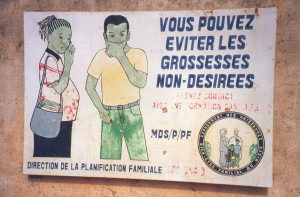The ECAF survey
Sexuality, Contraception, Unplanned Pregnancies and Abortion in West Africa and Morocco

The ECAF survey (Emergency Contraception in Africa) was conducted in 2006-2007 in three countries of West Africa-Senegal and Burkina Faso (French-speaking) and Ghana (English-speaking)-and the North African country of Morocco (French-speaking). The research concentrates on the capital cities, as they are where new contraceptive models are likely to be most widespread.
Similar protocols, centred around in-depth, semi-structured interviews, were used in all four countries, a means of clarifying which factors pertain to national contexts and which transcend those contexts, revealing instead the contraceptive difficulties encountered by women in general regardless of specific everyday realities. One finding is that women’s contraception situations vary with strength of family and sexual norms.
The factors impeding the use of contraception are fairly similar for the four countries: the importance attributed to fertility, the stigma attaching to sexual relations outside marriage, and the primacy of male sexual pleasure. What does differ from one country to another is how rigid those norms are and how different standards for the two sexes are. The stigma attaching to premarital sex is a useful means of discovering national specificities:
- It is particularly strong in Morocco, where sexual activity outside marriage is strictly forbidden. Moreover, demographic surveys do not collect any information on the subject (there is no module on sexual debut as distinct from union entry) and family planning programmes are exclusively for married women. Young Moroccan women avoid sexual relations with penetration and therefore do not feel concerned about pregnancy or contraceptive techniques. Their sole contraceptive method is to preserve their virginity, at the risk of unplanned penetration.
- Practices for avoiding penetration before marriage are occasionally mentioned in Senegal and Burkina Faso, but not as often as in Morocco. Premarital sex for women is tolerated there and accepted for men. Extramarital maternity is not readily accepted in these societies, but using "unplanned" pregnancy strategically to get a man to wed or to force one’s family to accept a particular union is often observed.
- In Ghana, by contrast, premarital sex is relatively well accepted and young women seem willing to use contraception in connection with it.
Specific contraceptive difficulties come to light in connection with countries’ family and sexual models. Contraception prevalence is highest in Morocco, which has a longstanding contraception diffusion policy that is fully integrated into the public health sector-in contrast to the other three countries. Moroccan women, like Moroccan men, seem to have genuinely endorsed the model of having no more than two children. For women in the other three countries, that model, currently promoted on economic and health grounds, is more often adopted by default and in some cases reluctantly, as it is frequently perceived-except among women with considerable social capital-as "Western," imposed from without.
Contraception prevalence varies among the three sub-Saharan African countries while use of medical methods (the pill, implants, IUDs, sterilisation) is fairly similar. The absence of any strong differences in women’s attitudes toward contraception may suggest that family and sexual models are changing in all four countries. But that similarity may be deceptive, concealing instead the persistence of a dominant patriarchal model (father and husband) that leaves women little real freedom to manage their emotional, sexual and reproductive lives.
Source: Sexuality, Contraception, Unplanned Pregnancies and Abortion in West Africa and Morocco: The ECAF Survey, Population, 2013/1 (Vol. 68)
Online: June 2013
